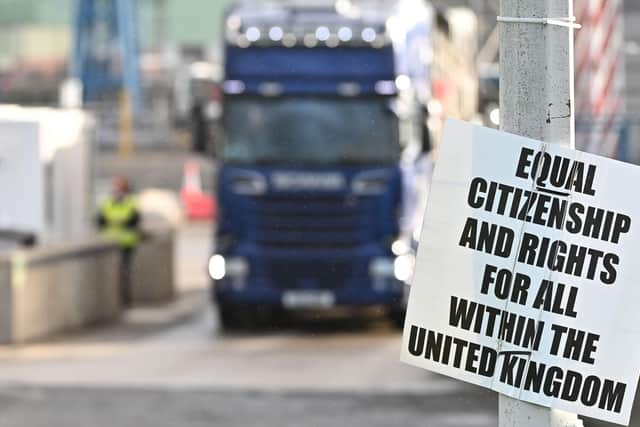Economic impact of Protocol ‘could justify unilateral action’, says think tank
and live on Freeview channel 276
A new report by the Institute of Economic Affairs says the protocol is “failing to deliver in its key objectives” and that “there has been significant diversion of trade, an outcome it expressly sought to avoid”.
The institute suggested that, “in the absence of agreement from the EU, the UK has grounds to take unilateral action to ensure prosperity and stability in Northern Ireland”.
Advertisement
Hide AdAdvertisement
Hide AdThe briefing paper cited estimations from economists – including Dr Esmond Birnie, senior economist at the Ulster University Business School, writing in the News Letter last August – that the protocol is costing the Province £850 million per year.


This includes £360m establishing and operating the Trade Support Service in its first two years, a further £150m on digital agri-food certification and tens of millions more in related funding to the NI Executive.
Victoria Hewson, the report’s author and IEA head of regulatory affairs said: “The protocol and the associated arrangements and documents are complex but the economic and political costs are clear.
“Even with only partial implementation the UK has spent £500m to try and make it work, and massive diversion of trade has followed as business try to work around the trade barriers between Great Britain and Northern Ireland.”
Advertisement
Hide AdAdvertisement
Hide AdShe continued: “Power-sharing and north/south cooperation, institutions of the Belfast (Good Friday) Agreement, have broken down. The protocol is not fulfilling the intentions of the parties, and it cannot be right to simply repeat that the UK entered into it voluntarily and should be strictly held to its terms,while the people of Northern Ireland suffer adverse effects.”
Commenting on the IEA report, Lord Frost, the UK’s former chief negotiator with the EU, said if Brussels will not negotiate “then the government will be right to intervene to restore stability”.
The IEA report also noted that between January to March 2021 checks on GB goods at Northern Irish ports represented 20% of all checks carried out at EU borders.
This figure, the IEA said, meant that Northern Ireland had more checks than any country in the EU despite NI’s population comprising just 0.5% of the entire European Union.